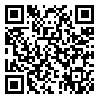BibTeX | RIS | EndNote | Medlars | ProCite | Reference Manager | RefWorks
Send citation to:
URL: http://jdisabilstud.org/article-1-1869-en.html
Background & Objectives: Marriage forms the foundation of the family, but more important than marriage is marital satisfaction. In recent years, couples have been interested in helping to improve their marital relationships through various treatment methods. Helping couples resolve marital problems requires understanding the factors and causes that affect marital dissatisfaction. Couples therapy can be an excellent way to make couples' relationships more enjoyable and revive their positive feelings about each other and their relationship. One of the psychological treatments that significantly impacts couples' problems is Acceptance and Commitment Therapy (ACT). Cognitive–Behavioral Therapy (CBT) is another therapeutic approach nowadays used to increase marital satisfaction and sexual intimacy. So, the purpose of the present study was to compare the effectiveness of CBT with ACT on increasing marital satisfaction and reducing anxiety in couples referred to counseling centers in Khorramabad City, Iran.
Methods: The research method was quasi–experimental with a pretest–posttest design and a control group. The study statistical population included all couples with marital disorders referred to the counseling center in Khorramabad in 2018. In this study, a sample of 30 couples was selected by convenience sampling method from all eligible couples with marital disorders referred to Khorramabad Improvement Counseling Center in 2018. The inclusion criteria included couples with marital conflicts, with at least a diploma, without history of psychosis, and with verbal consent to attend the study meetings. The exclusion criteria were non–compliance with the rules of the group therapy stated in the first session and abscence in more than two therapy sessions. The couples were randomly divided into three groups of 10 couples each in the ACT, CBT, and control groups. Research tools were the ENRICH Marital Satisfaction Scale (Fowers & Olson, 1993) and the Beck Anxiety Inventory (Beck & Steer, 1990). The two experimental groups received ACT and CBT in eight 90–min one session per week, but the control group received no intervention. The study data were analyzed using descriptive statistics (mean, standard deviation) and inferential statistics (univariate analysis of covariance and Bonferroni post hoc test) in SPSS software version 22. The significance level of the tests was considered 0.05.
Results: The changes in the mean scores of marital satisfaction and anxiety in the posttest after controlling the pretest scores were significant in both groups. That is, ACT and CBT were effective in increasing marital satisfaction (p<0.001) and reducing anxiety (p<0.001). The effect size of marital satisfaction and anxiety were 0.74 and 0.68, respectively. Also, there were significant differences in the variables of marital satisfaction and anxiety between the groups of ACT and CBT with the control group (p<0.001). There was also a statistical difference between ACT and CBT regarding the marital satisfaction and anxiety (p<0.001).
Conclusion: Based on the study findings, ACT is more powerful than CBT in reducing anxiety and increasing marital satisfaction of couples referring to counseling centers.
| Rights and permissions | |
 |
This work is licensed under a Creative Commons Attribution-NonCommercial 4.0 International License. |





